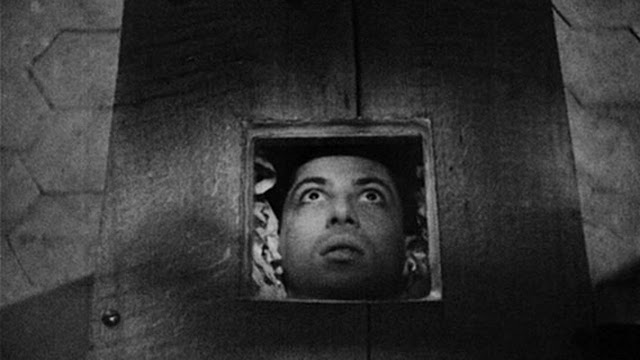Vampyr is Carl Theodore Dreyer's first sound film but it might as well be called a silent film since, like most of Dreyer's work, dialogue is kept to a minimum. In fact, the music takes over and envelopes the entire picture and transports us into one of the most unsettling and surreal realisation of a nightmare ever put into celluloid.
Julian West (also the producer) plays Allan Grey who travels to an inn and discovers strange, supernatural occurrences. A young woman is found with marks on her neck. An older woman is seen with her, presumably the vampire, hovering above her victim before suddenly disappearing. Now, that's what I think happens but it's not entirely clear.
Dreyer utilises a disjointed and jarring narrative style jumping from one scene to the next, from one character to another, without any clear links between them. We don't really know what is real and what is not real. We see from the perspective of Grey but we can't judge what is real, imagined or dreamt. Trying to distinguish what is what is futile. This is a film that is concerned more with setting an atmosphere than setting up a story.
There are intertitles in the beginning of the film that act as a silent voice-over. I tried imagining what it would have been like if these words were spoken. I cringed. The sombre mood would have been broken. Even if a serious voice was used it would still sound silly and if a dark, brooding voice was chosen then it would have felt like a parody.
Grey finds a book about vampires and discover that the strange occurrences eerily match the descriptions found in the text. Dreyer films the pages of the books, filling the screen with its inscriptions, acting as on-screen, silent narrators and thus taking over the role of the intertitles shown earlier.
There are intertitles in the beginning of the film that act as a silent voice-over. I tried imagining what it would have been like if these words were spoken. I cringed. The sombre mood would have been broken. Even if a serious voice was used it would still sound silly and if a dark, brooding voice was chosen then it would have felt like a parody.
Grey finds a book about vampires and discover that the strange occurrences eerily match the descriptions found in the text. Dreyer films the pages of the books, filling the screen with its inscriptions, acting as on-screen, silent narrators and thus taking over the role of the intertitles shown earlier.
Dreyer once said that "the old book is not a text in the ordinary, stupid sense, but an actor just as much as all the others." Even though the spoken dialogue in the film doesn't hold much presence, the on-screen text certainly do.
Familiar horror conventions are plentiful here but because of the unorthodox way in which they are filmed they seem fresh rather than stale. A shadow of a gravedigger filmed digging a grave plays out in reverse and you can't help but feel like you've lulled into a kind of enchanted trance.
Shadows leave the bodies they follow and spirits leave the bodies they bring life to and in a strange way, the film itself feels like it makes our consciousness leave our very own bodies, even for only an hour or so.
Familiar horror conventions are plentiful here but because of the unorthodox way in which they are filmed they seem fresh rather than stale. A shadow of a gravedigger filmed digging a grave plays out in reverse and you can't help but feel like you've lulled into a kind of enchanted trance.
Shadows leave the bodies they follow and spirits leave the bodies they bring life to and in a strange way, the film itself feels like it makes our consciousness leave our very own bodies, even for only an hour or so.
Images from The Movie DB, This is a repost from my previous blog FILM MUSIC ART

.jpg)



No comments:
Post a Comment